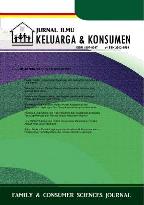PARENTAL SELF-EFFICACY DAN PRAKTIK PENGASUHAN MENENTUKAN PERILAKU AGRESIF ANAK USIA PRASEKOLAH
Abstract
This study aimed to analyze the factors which influence aggressive behavior. This study involved 36 families with preschool children, which were chosen purposively. The sample criteria of this study were mothers as primary caregiver who have children that were become students in early childhood care in Ciasmara Village, Pamijahan Sub District, Bogor District. The data were collected by interview technique using questionnaire. Data were analyzed by multiple linear regression test. The results showed that more than half of mothers had above average parental self-efficacy. This means that more than half of mothers in this study have high confidence in their ability to care for children. Parenting practice, especially in discipline parental dimension of mothers, was in the form of giving punishment like prohibit children to do what she/he likes such as prohibit to play, to watch TV or to buy snack. Moreover, negative parenting practices were shown in the form of not threatening to punish a child for stopping child's bad behavior. The result also showed that almost two-thirds of children behave aggressively below average. The results of this study found an influence of parental self-efficacy and negative parenting practices on aggressive behavior of preschool children.
Copyright (c) 2018 Jurnal Ilmu Keluarga & Konsumen

This work is licensed under a Creative Commons Attribution-ShareAlike 4.0 International License.
Authors submitting manuscripts should understand and agree that copyright of manuscripts published are held Jurnal Ilmu Keluarga dan Konsumen. The statement to release the copyright to Jurnal Ilmu Keluarga dan Konsumen is stated in Copyright Release Form. Copyright encompass exclusive rights to reproduce, to distribute, and to sell any part of the journal articles in all form and media. The reproduction of any part of this journal is allowed with a written permission from Jurnal Ilmu Keluarga dan Konsumen.









